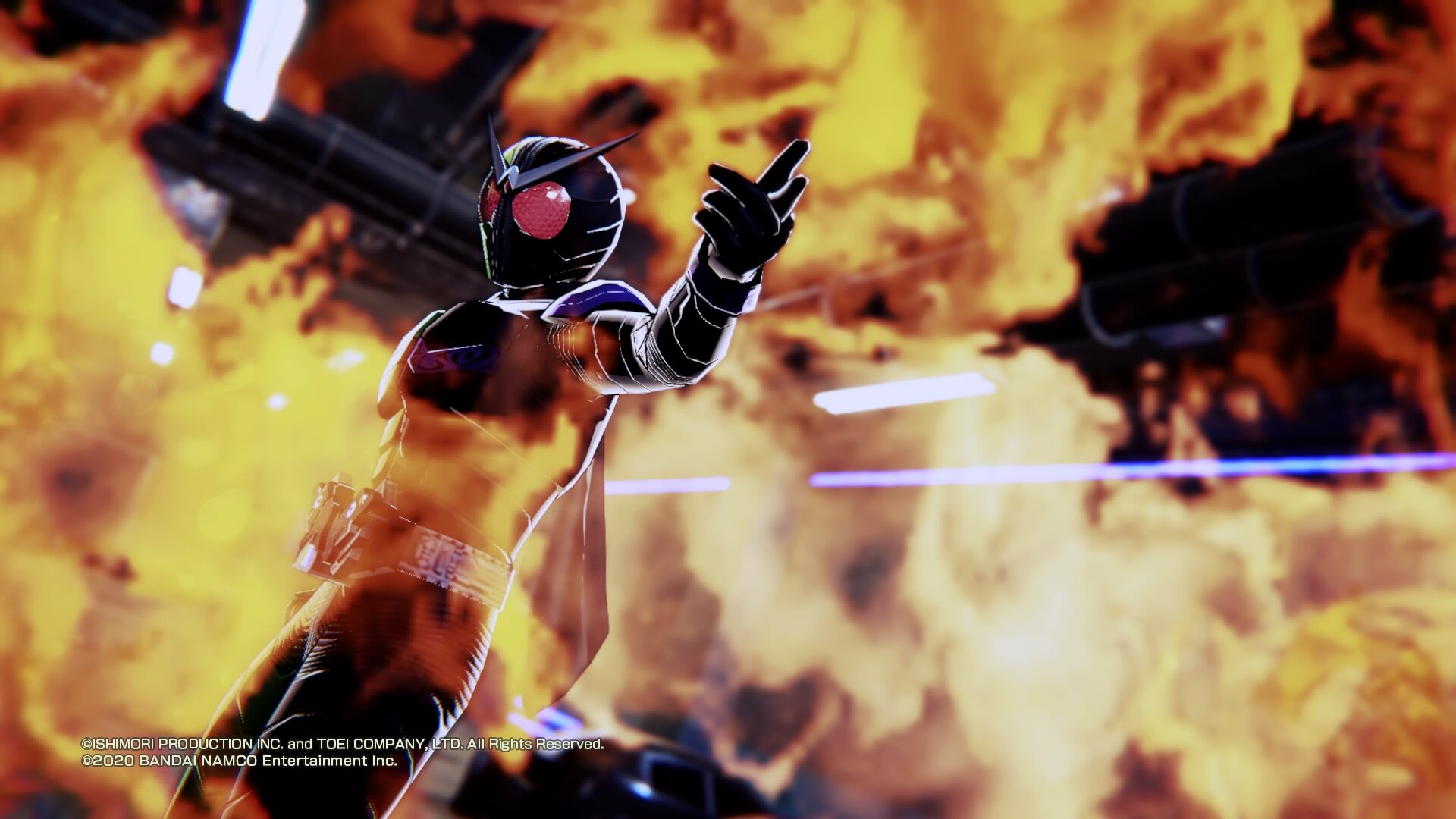Kamen Rider: Memory of Heroez Review - A Love Letter Trapped in a Bygone Era
/Long gone are the days where a popular show or movie property would get an obligatory shovelware video game tie-in. Quality was often less a priority, as said games would need to sell just enough to justify development costs. While this trend isn’t as widespread, it’s not uncommon for publishers to cash in on subpar product by riding the coattails of a popular brand.
WIth that said, I admit that I am a blatant sucker for the jump-kicking karate bug men and all the merch that follows them. I also long for the day when Kamen Rider games are granted the same level of attention and fidelity that Bandai provides to, say, their Dragonball or Gundam titles.
Kamen Rider: Memory of Heroez is one of the newest Kamen Rider games, and is also one of the few to have garnered an English release outside of Japan. Memory of Heroez is also a story-driven, third-person action adventure game, making it a deviation from the longer running Climax series of fighting games.
The Dark Souls of Kamen Rider
I'm going to be blunt about this. What makes Heroez’s gameplay different from other Rider games is that it ostensibly mimics the Souls series with its own version of a stamina gauge. While I make this comparison in jest, it's hard to avoid the elephant in the room.
To its credit, what the game dubs as "Rider Power" only depletes when performing certain actions, such as heavy attacks, unique attacks, dodging, and changing forms. Combat isn't as tight as in Soulsborne titles, but isn't as loose as a musou game, so the inclusion of a stamina resource for a lot of your heavy-hitting moves forces the player to take more deliberate and varied actions instead of simply mashing out the same attack combo over and over again.
This game doesn't have the deepest combat mechanics, but I do appreciate how you can add your own level of style by performing air juggles and mixing in various attacks by incorporating form changes mid-combo. The fights themselves aren't completely devoid of complexity, either. There’s a balance between crowd control and maintaining your combo count, as the game will throw multiple baddies your way at any given moment. Most goons will get rocked even by light attacks, but will occasionally armor through weaker hits while winding up for a punch that will either jostle you out of your current action or straight-up knock you down. Other enemy types sport an armor gauge that you’ll need to break in order to stagger them and deal proper damage. Certain forms and attacks will have greater effects on enemies’ armor, incentivizing more careful Rider Power management.
One other factor that comes into play when managing Rider Power is the fact that you can’t really heal during most of your runs through stages. Damage does not heal over time and there are no consumable items to speak of, so you’ll want to dish out those explosive jump kicks judiciously. You’ll primarily heal via computer terminals that act as checkpoints throughout the game. More often than not, these appear at a reasonable rate, but there are a few stretches where you won't run into them for a while. You can heal via a few breakable boxes that offer 50% life regeneration, but these are found at fixed points. There is also a healing effect if you perform a successful dodge and counter-attack against specific attacks, but as each successful instance only regenerates 10% of your HP, the extra damage VS your opponent is the real payoff there. If you do fall in battle, the game is considerate enough to let you choose to either redo the encounter or respawn to a point right before said combat encounter in order to either re-spec your Rider or swap characters.
Authentic Story
If you're planning to get this game, you’re most likely a Kamen Rider fan who’s seen their fair share of tokusatsu shows. I'm happy to say that the story feels very much like one of the yearly crossover movies. Characters meeting for the first time interact with each other much like you'd imagine; the narrative is very reverential of past events from the source material. I'd honestly say that the story is better written than some of the Rider shows and movies I've seen. It falls back on familiar tropes in the sense that the new villain has acquired a power that revives old-dead foes from the shows of featured heroes, but it’s nice to see that they take it to the next level. Characters acknowledge that they’ve been brought back and even allude to scheming against the new baddie once they have fulfilled their given tasks. If you're a fan of the featured Riders, you’ll get a kick out of the care put into the writing.
All the Henshin Belts and Whistles
Bandai has released a few games that feature a sort of "deluxe" edition separate from the standard release. For Memory of Heroez, this is the Premium Sound Edition, which features songs from Kamen Rider Double, OOO, Zero-One, and then some. These range from respective shows’ opening songs to specific themes and even memorable background tunes. The game itself has its own unique soundtrack that does a well-enough job, but sometimes you just can’t do without hearing those Rider-specific theme songs while performing their signature Rider Kicks. While the additional and somewhat hefty price tag slapped onto the Premium Sound Edition can be hard to justify, I do appreciate the options and the surprising level of player control at hand. You can set playlists for each Rider and each of their individual forms with up to 10 songs per playlist. You can play them sequentially, or shuffled. The songs aren't limited to their respective shows either. You can let your imagination run wild and set the opening song of Kamen Rider Double, W-B-X W-Boiled Extreme to OOO's TaToBa playlist and vice versa. The new main theme "Over Again" is great, and its jazzy tune is fitting given that Kamen Rider Double is the game’s lead Rider.
Stuck in the Heisei Era
Given that my initial impressions from a glance weren’t great, I went into Memory of Heroez keeping my expectations low, and while I did find enjoyment out of the combat and story, there are some issues I just can't let slide. First off are the visuals. The bright and vibrant cel-shading used on the character models is great, but that’s about where the praise ends. This honestly looks like something running on the PlayStation 2. I wouldn't be surprised if the character models were taken straight from the Kamen Rider PS2 and PSP fighting games and given a new coat of paint. For crying out loud, their hands don't even animate - instead, they switch from open and closed positions, like an action figure. The environments are flat, ugly, and empty. The story does explain why there are no civilians in the city, but all the areas in the game are just so lifeless. The topography of the city doesn't make a lick of sense, either. One minute you're roaming around destroyed city streets, then suddenly you find yourself in a lush forest. One door down and it's now a vast sandy desert that leads to an underground water treatment plant? Where in the world does such a place exist? To switch up the flow, the game will throw you into a few shoot-em-up minigame sequences ala Starfox. The minigames themselves weren't functionally bad, but I could have done without them.
Given how long Bandai has been making Kamen Rider games and video games in general, it's inexcusable for a modern video game to look this dated. And while bad graphics don't necessarily equate to a bad video game, one's tolerance to such can only go so far. I've played enough ugly third-person beat-em-ups that it’s hard for me to care if the gameplay doesn’t look at least a little bit appealing.
Kamen Rider: Memory of Heroez is probably the most ambitious Kamen Rider video game in a long while. It does a few interesting things to keep fans hooked, but doesn't do nearly enough by modern standards. I can't wholeheartedly recommend this game to anyone unless they are a diehard fan of the masked heroes.
7/10
Highlights
(+) Story is akin to that of a good Kamen Rider crossover movie
(+) Attacks and abilities mirror the source material very well, complete with all the Henshin Belt and weapon sounds
(+) The stamina system makes for more interesting and deliberate action decisions in combat
(-) Dated visuals that look more than two console generations old
(-) Difficulty changes don't affect much outside of increased or decreased enemy damage
What I’ve Played
Beat the main campaign on the Standard difficulty in about 11 hours
Played a few more hours of Survival Mode and New Game+ on the Extreme Difficulty
[This review is based on a PS4 review code provided by BANDAI NAMCO Entertainment.]




















Assassin’s Creed Shadows greatly blends the classic Assassin’s Creed stealth with the RPG elements of recent entries. Its dynamic world, seasonal changes, and improved stealth mechanics make exploration a joy, but Yasuke’s restrictive gameplay, overall story, and a half-baked notoriety system hold it back.